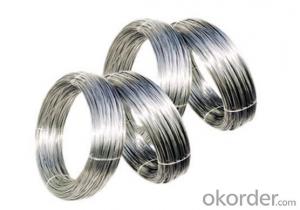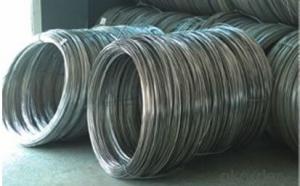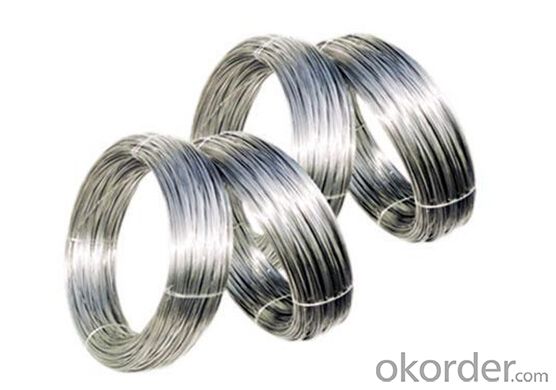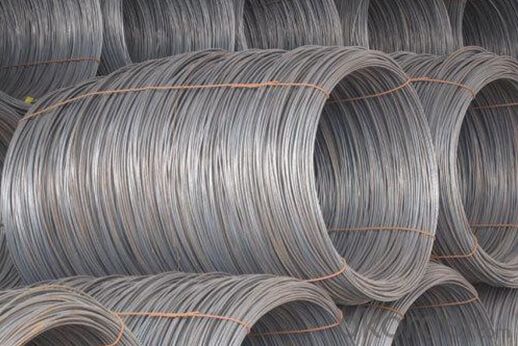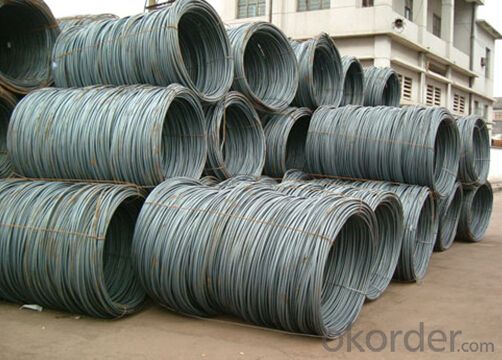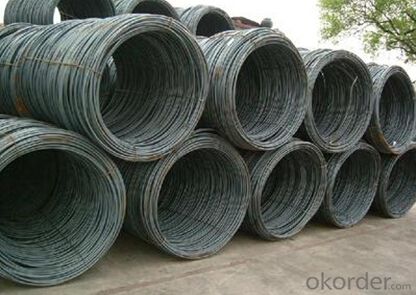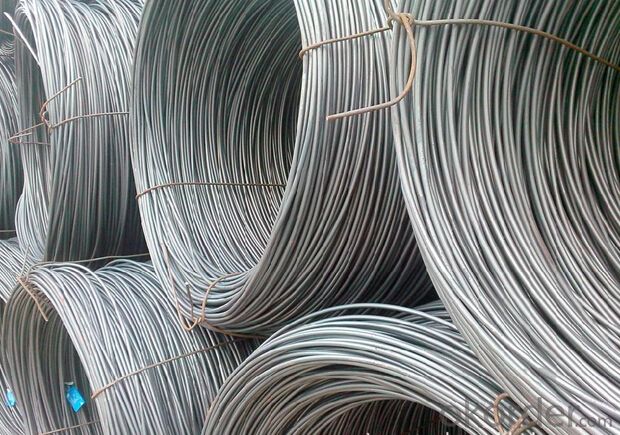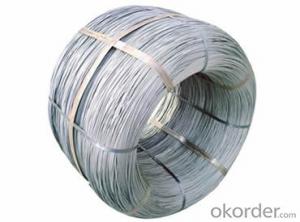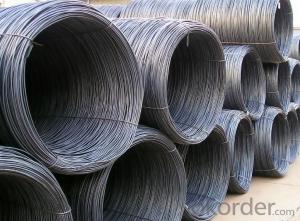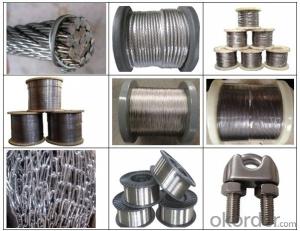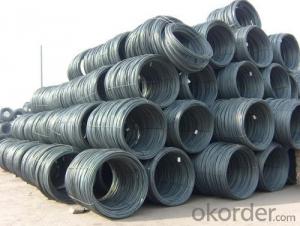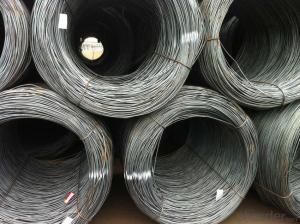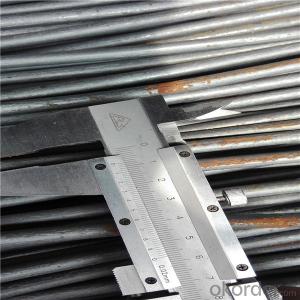8mm Hot Rolled Low Carbon Steel Wire Coil-Steel Wire Rods
- Loading Port:
- Tianjin
- Payment Terms:
- TT or LC
- Min Order Qty:
- 25 m.t.
- Supply Capability:
- 10000 m.t./month
OKorder Service Pledge
OKorder Financial Service
You Might Also Like
Specification
8mm Hot Rolled Low Carbon Steel Wire Coil-Steel Wire Rods
Specification
Name | 8mm hot rolled low carbon steel wire coil/steel wire rod |
Standard | GB, SAE, SGS, ASTM |
Diameter | 8mm |
Coil weight | 1.8-2.1tons |
MOQ | 25tons |
Deliver Time | 15 days after receipt of L/C or deposit by T/T |
Packing | In coil and load in container, if large quantity, by bulk vessel; can be packed as customers' special requirements |
Payment terms | 1).100% irrevocable L/C at sight. |
Application | Building material, machinery parts |
Chemical Composition
Grade | Chemical Composition(%) | |||||
C | Mn | Si | S | P | Cr | |
SAE1006B | 0.03~O.07 | ≤0.32 | ≤0.30 | ≤0.045 | ≤0.040 | 0.3-0.35 |
Mechanical properties | ||||||
Yield strength(N/mm2) | Tensile strength(N/mm2) | Elongation(%) | ||||
250-280 | 350-380 | ≥32 | ||||
Grade | Chemical Composition(%) | |||||
C | Mn | Si | S | P | Cr | |
SAE1008B | 0.10max | 0.3~O.50 | 0.15max | 0.050max | 0.040 max | 0.3-0.35 |
Mechanical properties | ||||||
Yield strength(N/mm2) | Tensile strength(N/mm2) | Elongation(%) | ||||
≥195 | 315-430 | ≥30 | ||||
Company Information
CNBM International Corporation is the most import and export platform of CNBM group(China National Building Material Group Corporation) ,which is a state-owned enterprise, ranked in 270th of Fortune Global 500 in 2015.
With its advantages, CNBM International are mainly concentrate on Cement, Glass, Iron and Steel, Ceramics industries and devotes herself for supplying high quality series of refractories as well as technical consultancies and logistics solution.
After-sale service | CNBM provides the services and support you need for every step of our cooperation. We’re the business partners you can trust; you can relax and get on with doing business. |
For any problem, please kindly contact us at any your convenient time, we’ll reply you in our first priority within 24 hours | |
Advantages | Industry experience over 20 years. |
Shipment of goods -More than 70 countries worldwide. | |
The most convenient transport and prompt delivery. | |
Competitive price with best service. | |
High technical production line with top quality products. | |
High reputation based on best quality products. |
Products Show
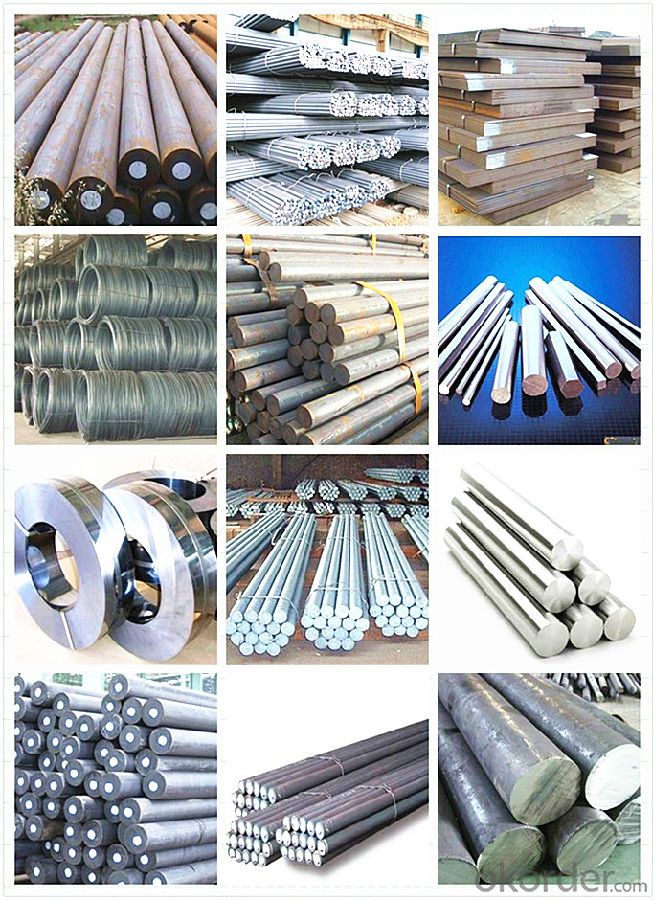
FAQ
Are you a trading company or manufacturer? | Manufacturer |
What’s the MOQ? | 3 metric ton |
What’s your delivery time? | 15-35 days after downpayment received |
Do you Accept OEM service? | Yes |
what’s your delivery terms? | FOB/CFR/CIF |
What's the Payment Terms? | 30% as deposit,70% before shipment by T/T |
Western Union acceptable for small amount. | |
L/C acceptable for large amount. | |
Scrow ,Paybal,Alipay are also ok | |
Why choose us? | Chose happens because of quality, then price, We can give you both. |
Additionally, we can also offer professional products inquiry, products knowledge train (for agents), smooth goods delivery, excellent customer solution proposals. | |
What's your available port of Shipment? | Main Port, China |
What’s your featured services? | Our service formula: good quality+ good price+ good service=customer's trust |
Where are your Market? | Covering more than 160 countries in the world |
- Q: How does special steel contribute to the telecommunications aftermarket industry?
- Special steel plays a crucial role in the telecommunications aftermarket industry by providing the necessary materials for the manufacturing and maintenance of various telecommunications equipment. This type of steel is specifically designed to possess exceptional properties, such as high strength, corrosion resistance, and durability, which are essential for the demanding conditions of the telecommunications sector. One of the main contributions of special steel to the telecommunications aftermarket industry is its use in the production of communication towers and transmission structures. These structures need to withstand extreme weather conditions, including strong winds and heavy loads, while also providing reliable support for antennas and other equipment. Special steel is capable of meeting these requirements, ensuring the longevity and stability of communication towers. Furthermore, special steel is extensively used in the manufacturing of cables and wires used in telecommunications systems. These cables need to transmit signals without any loss or interference, and the unique properties of special steel, such as high electrical conductivity and low resistance, make it an ideal material for this purpose. The use of special steel in cables helps maintain the quality and efficiency of telecommunications networks. Another significant contribution of special steel is in the production of equipment enclosures and cabinets. These enclosures provide protection to sensitive electronic components from environmental factors, such as moisture, dust, and extreme temperatures. Special steel, with its corrosion-resistant properties, ensures the longevity and reliability of these enclosures, safeguarding the valuable equipment inside. Moreover, special steel is also utilized in the manufacturing of various components and accessories used in the telecommunications aftermarket industry. These include connectors, brackets, and hardware, which are essential for assembling and maintaining telecommunications equipment. Special steel's high strength and durability make it a preferred choice for these components, ensuring their long-lasting performance. In conclusion, special steel contributes significantly to the telecommunications aftermarket industry by providing the necessary materials for the manufacturing and maintenance of various telecommunications equipment. Its exceptional properties, including high strength, corrosion resistance, and durability, make it an ideal choice for communication towers, cables, enclosures, and various components. By utilizing special steel, the telecommunications industry can ensure the reliability, efficiency, and longevity of its equipment, ultimately benefiting both service providers and end-users.
- Q: Can special steel be used in the sporting goods manufacturing industry?
- Yes, special steel can be used in the sporting goods manufacturing industry. Special steel alloys offer superior strength, durability, and corrosion resistance, which are crucial qualities for manufacturing various sporting goods such as golf clubs, bike frames, tennis rackets, and baseball bats. These alloys can be tailored to meet specific requirements, ensuring high performance and longevity in sports equipment.
- Q: How is precipitation-hardening steel used in aerospace applications?
- Precipitation-hardening steel is commonly used in aerospace applications due to its exceptional strength-to-weight ratio and excellent corrosion resistance. It is extensively used in critical components such as aircraft structural parts, landing gear, engine components, and fasteners. The precipitation hardening process involves heating and cooling the steel to create a fine dispersion of precipitates, which significantly enhances its mechanical properties. This steel's high strength allows for the construction of lighter and more fuel-efficient aircraft, while its corrosion resistance prolongs the lifespan of aerospace components, ensuring safe and reliable operation.
- Q: What are the different alloying elements used in special steel?
- There are various alloying elements used in special steel, including chromium, nickel, molybdenum, vanadium, tungsten, manganese, and silicon, among others. These elements are added in specific quantities to enhance the steel's properties such as corrosion resistance, hardness, toughness, and heat resistance, making it suitable for specific applications in industries like aerospace, automotive, and construction.
- Q: What is the importance of heat treatment in special steel?
- Heat treatment is crucial in the production of special steel as it significantly impacts its mechanical properties and performance. By subjecting the steel to controlled heating and cooling processes, heat treatment can enhance its hardness, strength, toughness, and resistance to wear and corrosion. Additionally, heat treatment helps to refine the microstructure of the steel, improving its grain size and distribution, which further enhances its mechanical and metallurgical properties. Overall, heat treatment plays a vital role in optimizing the performance and durability of special steel, making it suitable for various applications in industries such as automotive, aerospace, and construction.
- Q: What are the main manufacturing processes for special steel?
- The main manufacturing processes for special steel typically include melting, refining, casting, hot rolling, heat treatment, and finishing.
- Q: How is special steel used in the marine supply chain?
- Special steel is widely used in the marine supply chain for various applications. It is commonly used in the construction of ships and offshore structures due to its high strength, corrosion resistance, and durability. Special steel is used for manufacturing ship hulls, propeller shafts, engine components, and other critical parts that require exceptional strength and resistance to harsh marine environments. Additionally, special steel is utilized in the production of marine equipment such as anchors, chains, wire ropes, and connectors, ensuring their reliability and safety in maritime operations.
- Q: How does special steel contribute to the manufacturing of surgical instruments?
- Special steel, also known as stainless steel, plays a crucial role in the manufacturing of surgical instruments. The unique properties of special steel make it an ideal material for producing high-quality surgical instruments that are used in various medical procedures. Firstly, special steel is highly resistant to corrosion and rust. Surgical instruments are constantly exposed to bodily fluids, sterilization processes, and harsh cleaning agents. The corrosion resistance of special steel ensures that these instruments remain durable and can withstand repeated use and cleaning without losing their integrity. Secondly, special steel has excellent strength and hardness properties. Surgical instruments need to be sturdy and able to withstand the forces and pressures exerted during surgeries. The high strength and hardness of special steel ensure that these instruments retain their shape and sharpness even after multiple uses, reducing the risk of breakage or deformation during critical procedures. Moreover, special steel is biocompatible, meaning it does not react with bodily tissues or fluids. This is crucial for surgical instruments that come into direct contact with patients' bodies. The biocompatibility of special steel ensures that there are no adverse reactions or complications when these instruments are used in surgeries, minimizing the risk of infections or other complications. Additionally, special steel can be easily machined and fabricated into intricate shapes and designs. Surgical instruments require precision and accuracy to perform their intended functions effectively. The machinability of special steel allows manufacturers to create complex instruments with fine details and features, ensuring their optimal performance during surgical procedures. Furthermore, special steel can be sterilized efficiently. Sterilization is a critical step in ensuring the safety and effectiveness of surgical instruments. Special steel's ability to withstand high temperatures and various sterilization methods, such as autoclaving or ethylene oxide gas sterilization, makes it an ideal material choice for surgical instruments. In conclusion, special steel contributes significantly to the manufacturing of surgical instruments due to its corrosion resistance, strength, biocompatibility, machinability, and sterilization capabilities. These properties ensure that surgical instruments made from special steel are durable, reliable, safe, and effective in medical procedures, ultimately contributing to the overall success of surgeries and patient outcomes.
- Q: How does special steel comply with international standards?
- Special steel complies with international standards through a rigorous quality control process that involves testing the material for its chemical composition, mechanical properties, and dimensional accuracy. These standards, such as ISO, ASTM, and DIN, ensure that the steel meets the required specifications and performance criteria for various applications. Manufacturers also follow strict production guidelines and undergo regular audits to maintain compliance with these international standards.
- Q: How does special steel perform in terms of high-temperature strength?
- Special steel typically performs very well in terms of high-temperature strength. It has excellent resistance to thermal fatigue, oxidation, and creep, allowing it to withstand extreme heat conditions without losing its structural integrity or mechanical properties. This makes special steel a preferred choice in applications where high-temperature strength is crucial, such as in the aerospace, power generation, and petrochemical industries.
Send your message to us
8mm Hot Rolled Low Carbon Steel Wire Coil-Steel Wire Rods
- Loading Port:
- Tianjin
- Payment Terms:
- TT or LC
- Min Order Qty:
- 25 m.t.
- Supply Capability:
- 10000 m.t./month
OKorder Service Pledge
OKorder Financial Service
Similar products
Hot products
Hot Searches
Related keywords
